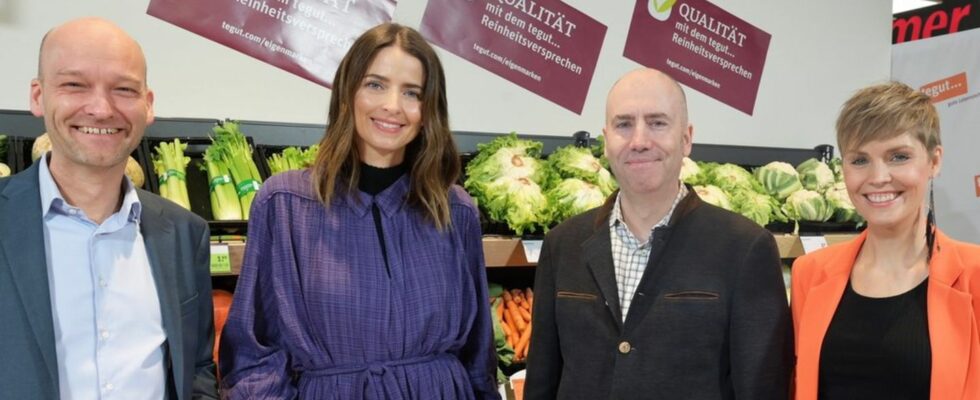Eve Padberg
This is how she teaches her daughter about conscious nutrition
Caption: Eva Padberg (2nd from left) at the tegut roundtable in Munich – with Matthias Pusch and Thomas Gutberlet from tegut and nutritionist Carolin Kotke (from left to right)
© tegut
Conscious nutrition can save money and resources. How can it become part of everyday life for families with children?
Less organic, fewer branded products, less fresh: When it comes to saving money, many Germans make cutbacks when buying groceries. According to a study by the food retailer tegut, more than 50 percent have been saving on food purchases since inflation began. The rumor that healthy eating is expensive and time-consuming persists. Conscious eating often seems like a mammoth task, especially in the turbulent everyday life with children. But that need not be. How do you teach children to be more aware of their diet and at the same time save resources and money?
“I try to cook with my daughter,” says model Eva Padberg (43) at the roundtable of the food retailer tegut in Munich. “In this way, she gets to know more food and develops an interest in the taste. Standing in the kitchen together is also valuable family time.”
Involve children in meal planning
A good opportunity to make conscious eating an integral part of everyday family life is the weekly grocery shopping. “It’s never a good idea to go to the supermarket hungry,” says Eva Padberg. “You should really think about what you want to eat for the week beforehand,” says the mother of a four-year-old daughter. “We often create a meal plan for the week as a family.”
The model also builds on certain foods that it must always have in the house: “Lemons, because I drink warm water with half a squeezed lemon every morning. If you have small children, you always have to have carrots in the house – they are the perfect snack for in between. We also always have apples at home.”
Make fresh food tasty
Much of the food we eat every day should be of plant origin. Fresh products such as fruit and vegetables contain significantly more nutrients and keep you full for longer. The German Society for Nutrition recommends five servings of vegetables and fruit a day, plus plenty of grain products such as bread, pasta or rice. Animal products play a rather subordinate role.
Nutrition expert Carolin Kotke also confirmed this at the round table in Munich: “Good nutrition can also be cheap. Fruit and vegetables in particular are the most important foods because we need the nutrients.”
It’s a similar story in the Padberg household: “As a family, we eat as little meat as possible at home, with exceptions, for example when we’re with my parents. But you can conjure up beautiful and exciting recipes with plant-based foods in particular, which also have a Offer variety. I try to cook as diversely as possible and then consciously rely on plant-based foods.”
Use leftovers together
Food waste is a burden on the wallet and the climate. Around eleven million tons of food end up in the garbage in Germany every year. “I’m a big fan of freezing things or eating the leftovers the next day,” says Eva Padberg. This also increases creativity when cooking, especially with children: “I always make sure that I make something new from a dish from the day before. For example, I recently formed balls of leftover risotto with my daughter, breaded them and fried them. The little one had so much fun doing that and we ended up with a new dish: Arancini.”
Preserving fresh produce is also a good way to reduce food waste and incorporate more fruit and vegetables into your everyday life. “I buy a lot of seasonal products and then can them,” explains Padberg. Especially when you have less time, I like to make potatoes with quark and a healthy vegetable alternative from a disposable glass in the evening.”
Bans are counterproductive
According to Padberg, involving children in shopping and cooking is a good way to bring them closer to conscious nutrition. “I have the feeling that my daughter is very open-minded about a lot of things when it comes to nutrition. I think that because we involve her a lot and let her make decisions, the deterrent just isn’t there with a lot of food. We don’t force anyone to eat anything eat whatever he doesn’t feel like doing.”
The model, on the other hand, finds bans counterproductive. “We are very relaxed about chocolate and sweets. I think that when it comes to nutrition, more things break if you try to force or pressure them into it, because the children then shut them down immediately. You have to let the children do a bit. They have one good sense of what is good for them and what is not.”
